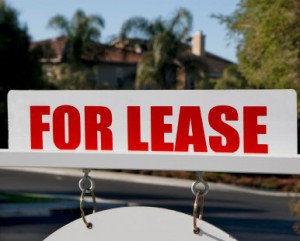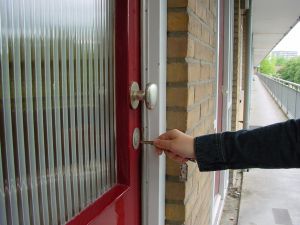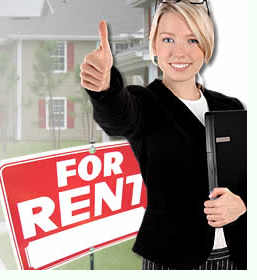Posted by Teresa on August 2, 2012 under Eviction, Landlord Tips, Tenant Credit Checks | 
 Experienced landlords know that being tough is an important part of their job descriptions. With the economy still suffering and unemployment still high, many prospective tenants’ credit scores have taken a beating. But should landlords take into consideration the difficult economic circumstances of many American families when deciding whether or not to approve a lease application?
Experienced landlords know that being tough is an important part of their job descriptions. With the economy still suffering and unemployment still high, many prospective tenants’ credit scores have taken a beating. But should landlords take into consideration the difficult economic circumstances of many American families when deciding whether or not to approve a lease application?
In other words, should landlords overlook lower credit scores or bankruptcy filings and try to help lease applicants?
Certainly, every situation is different. Many landlords will not budge on their credit requirements. Others look at the whole picture, and will pass a less-than-stellar credit score if the tenant has a steady paycheck that more than covers rent and other living expenses. Still others check prior evictions, and if there are none, then they will take a chance on the tenant.
And then there are the landlords who aren’t tough enough to say “no” to a prospective tenant with a poor credit history and no steady job. Whether they feel a sense of obligation or feel sorry for the tenant, they sign the lease and hope for the best. Often, they end up losing money, can’t get rid of the tenants and rack up thousands of dollars in eviction fees.
Trying to help people is noble, but it’s not a landlord’s job. A landlord’s job is to provide safe housing, to protect other tenants from potential harm, and to earn a profit from leasing property. You may hear sad stories of job loss, divorce, illness, death of loved ones and tough times. There is no doubt that it’s difficult to make a decent life for a family these days, when good jobs are hard to find.
Nobody wants to see a family out on the streets. But landlords have to be tough to protect themselves and their sizable investment. Checking tenant credit histories, conducting background checks, and sticking to your minimum qualifications will keep your rental property business strong and sustainable into the future. If you’re not tough enough, you may not have a future in the landlording business.
Posted by Teresa on June 24, 2012 under Eviction, Fair Housing Act, Landlord Tips | 
 If you’re thinking about investing in rental property, particularly as demand for rentals is increasing and housing prices are at the low point in many markets, there is a lot you’ll need to learn. Some aspects of landlording can only be learned through experience, but others are important to understand from the very beginning, to ensure you’re in compliance with property and tenant regulations.
If you’re thinking about investing in rental property, particularly as demand for rentals is increasing and housing prices are at the low point in many markets, there is a lot you’ll need to learn. Some aspects of landlording can only be learned through experience, but others are important to understand from the very beginning, to ensure you’re in compliance with property and tenant regulations.
Even if you’ve been a landlord in the past, you’ll need to brush up on new laws. For example, in many states, certain disclosures are required to protect tenant health. You may be required to reveal exposure to floods, mold or radon. Some states require indoor air tests or other environmental testing. Federal laws require landlords to disclose lead-based paint hazards in buildings built prior to 1978. You may be required to provide smoke detectors, carbon monoxide detectors, or both.
The federal Fair Housing Act prohibits discrimination in renting property based on a person’s race, color, religion, national origin, gender, marital status or disability. Landlords may not prohibit children in rental property, unless it is a senior-only community.
Landlords are required to provide safe and habitable units for tenants, according to local and state housing and health codes. All utilities must be operational. Necessary repairs must be made promptly. Lighting, locks and grounds should be maintained to prevent crime and injuries. Landlords cannot force tenants to move by turning off heat, lights, or water, by changing locks or removing the tenant’s property. Check local statutes for the guidelines and proper process for evicting tenants.
In many states, security deposits are strictly regulated, including the amount that may be charged, where the funds are kept (such as in a separate bank account from rents or in an interest-earning account) and how they are disbursed to former tenants. You may also be limited as to what the security deposit can cover. Some states allow deposits to cover unpaid rent, while others limit their use to just damages. Landlords may be required to refund a security deposit in a certain number of days.
The proper handling of a tenant’s property is another potentially sticky area. When a tenant leaves property behind, you may be required to prepare an inventory and have a law enforcement officer sign off on it. Depending on where you live, a landlord may be prohibited from moving a tenant’s property off the premises; or they may be allowed to dispose of it after a set period of time. Check your local laws to ensure compliance.
Becoming a landlord can be a profitable venture. Just be sure you’re in compliance with local, state and federal laws, or you may have legal fees that can wipe out your potential gain.
Posted by Teresa on May 23, 2012 under Legal | 
 In the wake of the Treyvon Martin shooting earlier this year, rental property owners and managers are rightly concerned about possible liability for actions taken by tenant watch or apartment watch groups on their properties.
In the wake of the Treyvon Martin shooting earlier this year, rental property owners and managers are rightly concerned about possible liability for actions taken by tenant watch or apartment watch groups on their properties.
In a case that made headlines everywhere, 17-year-old Martin was shot and killed by a neighborhood watch leader while visiting his father, who lives in the community. Evidence keeps coming out, but it is unknown what exactly happened that day. The shooter, George Zimmerman, has been charged with second-degree murder.
The circumstances around the shooting have many wondering who is liable for Zimmerman’s actions? Was he sanctioned by the homeowners association in the community? Will the individual homeowners be subjected to a lawsuit and paying damages? And if something like this happened on a rental property, would the owner be liable for a tenant watch group’s actions?
It’s a tough call. In many communities, the police have encouraged citizens to form crime watch, neighborhood watch and tenant watch associations to discourage and report crime in their communities. Many of these groups were formed with the help of the local police.
The inherent risks in sponsoring or advocating for a tenant watch group can be mitigated by including the local police department for guidance and training, as well as by consulting with an attorney who specializes in homeowners and community associations. It’s also important to create a process of recruiting only responsible volunteers who will follow procedures, and screening each potential volunteer.
Establishing procedures for reporting suspicious activity and keeping safe are vital for success and safety, and “do not engage” and “no guns allowed” rules are the most important. In the Martin case, Zimmerman was told to remain in his car, but ignored that directive from the police dispatcher.
Still, a landlord or property manager cannot prevent accidents or lapses in judgment. And in the Martin case, if Zimmerman is found guilty, it’s likely a lawsuit against the community’s homeowner association and property management company will follow.
Could the same thing occur in your duplex, rental home or apartment complex? If you want to avoid liability, then perhaps hiring a private security firm is the better way to go.
Legal disclaimer:
The contents of this article are intended for general information purposes only, and should not be relied upon as a substitute for obtaining legal advice applicable to your situation.
No matter how competitive your rents are, you need to protect your rental property and assets with tenant background checks. Proper tenant screening will ensure you are leasing to the best possible tenants.
Posted by Teresa on May 20, 2012 under Rents and Deposits | 
 Our last post covered ways to incentivize tenants to pay rent online. One reader asked for a list of online rent payment services. So we’ve rounded up a list of popular online rent payment services, along with what makes each one unique.
Our last post covered ways to incentivize tenants to pay rent online. One reader asked for a list of online rent payment services. So we’ve rounded up a list of popular online rent payment services, along with what makes each one unique.
RentPayment – This company says it’s the largest electronic payments processor in the multifamily industry. RentPayment was founded in 1999 and has since acquired a couple of competitors along the way. The company offers credit card and debit card rent payment on their website. Tenants can also pay rent by phone, by using the company’s iPhone app, or by text. Tenants who sign up for RentByText get monthly text reminders when rent is due. They simply reply “Pay,” and their rent is automatically paid via their debit/credit card or through an e-check. Property managers collecting paper checks can use RentPayment’s check scanning services to capture check images digitally, and then deposit them without leaving the office.
RentPayment’s extensive marketing efforts are intended to increase use of its services. They offer magnets, brochures, posters and signs to help spread the word about the advantages of paying rent online through their services.
Pricing: The monthly fee is $9.95 to set up accepting e-check payments through RentPayment, which includes 10 e-check transactions. Funds are deposited into your bank account within one or two business days. Tenants may pay online for free. Additional e-checks are $1.00 each. The fee to accept credit cards is 2.95% of the total amount. Debit cards are 1% of the total amount. Tenants may pay online, by phone, or text for free.
PayLease – PayLease also offers rent payments via e-checks and credit cards, either one-time or recurring. They also offer the means for property managers to make payments into the building owner’s bank account. Another unique feature of PayLease is an integrated online lease application system. Prospective tenants may submit an application and pay the application fee at the same time. Property managers are notified via email that a new application has been submitted.
Tenants may pay rent online or over the phone. Email reminders are also avaialable.
Pricing: PayLease allows rental property owners to pay the transactions fees for online payments, or pass the fee along to tenants. The company also offers a rebate program. The more online payments tenants make, the bigger the rebate. Monthly and/or transaction fees are priced individually.
PayYourRent – PayYourRent was developed by property managers. They offer rent and security deposit payment processing by e-check or credit card, along with additional automatic management services, such as maintenance requests, rental applications, utility connections and check scanning. PayYourRent also offers a payment portal that you can customize with your company’s logo, address and other information.
Pricing is provided upon request. Tenants may pay rent online. PayYourRent offers 24-hour payment processing, so funds are available more quickly.
eRentPayment – eRentPayment allows property managers to collect rent, application fees and security deposits online. Tenants may pay rent online each month, sign up for recurring automatic payments or pay by phone. Managers may also refund security deposits to tenants through the service. Rent payments submitted late are automatically charged a late fee, and managers/owners have the option of blocking partial payments. There are no extra fees to use multiple bank accounts.
eRentPayment offers a solution for tenants without Internet access, as well. Managers may submit a form, signed by the tenant, authorizing an automatic monthly debit from their bank account. Tenants may not alter the payment without submitting another application.
Pricing: Each transaction is $3.00. Property owners and managers may choose to pay the entire transaction fee, split it with the tenant, or have the tenant pay the fee. eRentPayment also offers vacancy listings for no charge.
Posted by Teresa on May 2, 2012 under Landlord Tips | 
 Rental property owners have the responsibility to provide their tenants with safe and habitable housing. Not only is it the law, but focusing on safety can prevent accidents and other problems that can lead to crime on your rental property, injuries for tenants and visitors, and lawsuits for landlords.
Rental property owners have the responsibility to provide their tenants with safe and habitable housing. Not only is it the law, but focusing on safety can prevent accidents and other problems that can lead to crime on your rental property, injuries for tenants and visitors, and lawsuits for landlords.
Here are some safety guidelines for every landlord and property manager:
- Conduct regular property safety inspections. Check for leaking pipes, broken windows, broken or rotted stair treads, and damaged wood on railings, balusters and decks. Inspect electrical wiring and make sure smoke and CO2 detectors are installed according to building codes and are in operating order.
- Perform preventative maintenance. Fix what needs to be fixed, especially things that cause a safety hazard, like tripping hazards, broken locks or unsafe railings.
- Provide fire extinguishers for each rental unit. Educate tenants on escape routes in case of a fire.
- Take care of broken tree limbs, snow and ice immediately. Clean up piles of fallen leaves, especially on the stairs, where they can cause slipping.
Preventing crime is everyone’s responsibility. To discourage criminal activity, tenants should:
- Keep vehicles locked and avoid leaving items in them in plain sight.
- Never leave valuables in vehicles.
- Observe their surroundings and report any suspicious activity, persons or vehicles.
- Remind tenants that they are responsible for the actions and behavior of all their guests.
- Never copy keys.
- Not allow strangers into a building with controlled access doors. Have them contact the person they are visiting.
Landlords and property managers should:
- Keep parking areas, sidewalks, common areas and stairwells well lit. Ask tenants to inform you of any burned-out lights.
- Provide properly locking doors and windows.
- Trim shrubs and trees around windows.
- Communicate with tenants. Ask about any potential crime or safety problems.
- Regularly inspect properties for signs of potential criminal activity.
- Include a clause in the lease that states tenants will be evicted for dealing, selling or manufacturing drugs on the property, or for allowing such activity by others.
- Screen all prospective tenants. Run a criminal background check on each applicant, so you know that they are who they say they are. Tenant screening will help keep violent criminals or sex offenders out of your rental property, and will help keep everyone safer.
Posted by Teresa on April 24, 2012 under Fair Housing Act | 
 Landlords, how closely do you monitor your property managers? Do you allow them to run your properties however they see fit, or do you run a tighter ship? When you realize that a property owner is often liable for the actions taken by those acting on his or her behalf, you may want to consider keeping a closer eye on your manager.
Landlords, how closely do you monitor your property managers? Do you allow them to run your properties however they see fit, or do you run a tighter ship? When you realize that a property owner is often liable for the actions taken by those acting on his or her behalf, you may want to consider keeping a closer eye on your manager.
For example, one rental property owner was surprised to hear that her long-time property manager had been “protecting the property” by rejecting lease applicants with children. This action is in violation of federal fair housing laws, which prohibit discrimination against applicants on the basis of race, color, national origin, religion, sex, familial status or handicap. Even through the property manager was acting on her own, the building owner still has the responsibility to supervise her staff and prevent any discriminatory actions from taking place.
In a related case, an apartment property manager was found to be turning on the lawn sprinklers whenever children who lived in the complex were playing outside. By his actions, he was creating a hostile environment for the families with children, who were forced to keep the kids inside. If a tenant complained to the local fair housing agency, the landlord could end up as the target of an investigation.
A third example is the property owner who received a letter from a tenant, complaining about the resident manager. The tenant said the male manager was too friendly with her teenage daughter, and was frequently seen near the apartment when the girl was home alone. This behavior, which also creates a hostile environment is often classified as sexual harassment—and is also illegal under the federal Fair Housing Act. Even though no actual inappropriate actions had yet been taken, the daughter’s discomfort is significant enough to warrant action by the property owner.
In many cases, rental property owners are just a complaint away from a discrimination lawsuit—whether or not they are aware of the illegal activities of their property managers. The best bet is to keep a close eye on what’s going on at your properties. Remember, you are ultimately responsible for every decision or action by a property manager that affects your tenants.
Posted by Teresa on April 10, 2012 under Landlord Tips | 
 It seems that the news is full of reports of break-ins at empty houses. Thieves are going after anything they can sell, from brass chandeliers to copper pipes, to aluminum siding.
It seems that the news is full of reports of break-ins at empty houses. Thieves are going after anything they can sell, from brass chandeliers to copper pipes, to aluminum siding.
If you’re a landlord with a vacant rental property, or are remodeling a property to prepare it for leasing, you may be concerned about break-ins.
Here are a ten tips to keep thieves or drug users out of your vacant property:
- Install an alarm system. Some landlords sign contracts with alarm companies, and then adjust the rent to include the monthly service fee. If you have an alarm system, be sure to lock the electric meter box. Otherwise, criminals could turn off the power and enter the house after the back up battery dies. Some systems work only off of batteries and cell networks, so there are no electrical wires to worry about.
- Do-it-yourself surveillance systems with several cameras and motion detection are available for less than $500. They feature Internet and smartphone monitoring and will alert you through email or text of any activity at your property.
- Post signs that the property is under camera surveillance. Whether you use cameras or not, it may encourage thieves to move on to another property and leave yours alone.
- Your first floor is most at risk. Try installing “Protected by Security System” window stickers and exterior signs near the doors that mimic alarm company signs.
- Savvy criminals may not fall for the fake signs, but many would probably not risk it.
- Install sturdy solid wood or steel-wrapped wood entry doors. If the door has a window, install double cylinder deadbolt locks—the type that require a key to open or lock them on both sides. Be sure to check local ordinances, however—for safety reasons. A door that requires a key to open from the inside could be dangerous during a fire or emergency. You can always switch to single cylinder lock after your tenants move in.
- Buy a “FakeTV,” a small device that mimics the changing light and colors of a television. From outside, it looks like a television is on. Just plug it in and set the timer.
- Leave a radio on. Make sure it’s loud enough to hear from exterior doors and windows. You may wish to put it on a timer and set it to switch on for several hours and then switch off late at night.
- Leave some lights on. Buy a timer and have them come on in the evening, and turn off around midnight or so. Install motion-detector floodlights that cover the front, back and sides of the house. Not only will the sudden light startle would-be thieves, it will also warn neighbors that someone is outside your vacant rental property.
- If you know any of the neighbors, ask if they would like to use your driveway for one of their vehicles. They will probably appreciate your efforts to ward off thieves.
Another tip for vacant homes: turn off the water meter at the street, in case thieves do break in and steal pipes, valves or fittings.
No property is 100% theft-proof, but the more deterrents you put in front of criminals, the better chance you’ll have of encouraging them to leave your vacant rental property alone.
Protect your rental property and assets through tenant background checks. Proper tenant screening will ensure you are leasing to the best possible tenants.
Posted by Teresa on March 30, 2012 under Housing Trends, Landlord Tips, Lease and Rental Agreements | 
 It seems that smokers are having more and more trouble finding places to light up these days. They can’t smoke at work, or in most other public places, like bars and restaurants. Some municipalities are banning smoking in outdoor parks and other public places, too. Seems like his or her own home will soon be the only place a smoker can legally smoke. Unless they live in a no-smoking rental property.
It seems that smokers are having more and more trouble finding places to light up these days. They can’t smoke at work, or in most other public places, like bars and restaurants. Some municipalities are banning smoking in outdoor parks and other public places, too. Seems like his or her own home will soon be the only place a smoker can legally smoke. Unless they live in a no-smoking rental property.
Is that the case for your rental properties? Are your tenants allowed to smoke in their units, or in common areas? For an increasing number of landlords, the answer is “no.” It’s not so much the smokers’ health that landlords are concerned about—it’s the health of the rest of tenants, including children, who are subjected to second-hand smoke.
If you’re ready to ban smoking in your rental properties, you might experience some pushback from smoking tenants. Smoking is legal, after all. But landlords are within their rights to ban many legal activities, such as owning a pet, playing loud music or operating a business from home.
In many states, laws are changing to specifically state that landlords may adopt no-smoking policies. And some cities have instituted smoking bans on multiunit properties.
A new no-smoking policy generally requires 30 days’ notice before it can go into effect. A tenant with a current lease cannot be subjected to the ban until the lease expires and they sign a new one.
If you’re going smoke-free, think about how you’ll handle your policy. Will you include all units as well as common areas? Will smokers be allowed to smoke in a far corner of the property, or in an isolated area of the parking lot? How will you handle violators? If you own several buildings, would you convert some to smoking and the rest to non-smoking?
There are several ways to approach it, but encouraging tenants to give up smoking is good for everyone. After all, if you won’t subject a tenant to a neighbor’s noise, why would you want to subject him or her to a neighbor’s second-hand smoke?
Protect your rental property and assets through tenant background checks. Proper tenant screening will ensure you are leasing to the best possible tenants.
Posted by Teresa on March 20, 2012 under Rents and Deposits | 
 If you’re new (or not) to landlording, you may be wondering about how to set your security deposit requirements. Many landlords charge one month’s rent, plus extra for pets. Others charge higher deposits, to protect themselves from paying for excessive damages when tenants move out.
If you’re new (or not) to landlording, you may be wondering about how to set your security deposit requirements. Many landlords charge one month’s rent, plus extra for pets. Others charge higher deposits, to protect themselves from paying for excessive damages when tenants move out.
But it’s important to know that many states mandate what rental property owners may charge tenants for security deposits. Limits range from one month to three months, to no statutory limits at all
Here are some examples of states that do require limits on tenant security deposits:
| Alabama |
One month’s rent, except for pet deposits |
| Alaska |
Two months’ rent, except where rent exceeds $2,000 per month |
| Arizona |
One and one-half months’ rent |
| Arkansas |
Two months’ rent |
| California |
Two months’ rent for unfurnished rentals, three months’ rent for furnished. Extra one-half month’s rent for waterbed |
| Connecticut |
Two months’ rent for tenants under 62 years of age; one month’s rent for tenants 62 years of age and over |
| Delaware |
One month’s rent on one year or more leases; no limit for month-to-month rental agreements; no limit for furnished units |
| Kansas |
One month’s rent (unfurnished), one and one-half months’ rent (furnished), extra one-half months’ rent for pets |
| Michigan |
One and one-half months’ rent |
| Nebraska |
One month’s rent for no pets, one and one-quarter months’ rent with pets |
| Nevada |
Three months’ rent |
| New Hampshire |
One month’s rent or $100, whichever is greater (!); no limit when landlord and tenant share facilities |
| New Jersey |
One and one-half months’ rent. Additional security deposit may not exceed 10% of the current security deposit. |
| New Mexico |
One month’s rent on one year or less leases; no limit for leases of one year or more |
| North Carolina |
One and one-half months’ rent for month-to month agreements, two months’ rent for if term is longer than two months |
| North Dakota |
One month’s rent, with pet, not to exceed the greater of $2,500 or two months’ rent |
| Pennsylvania |
Two months’ rent for first year of renting; one month’s rent during second and subsequent years |
| South Dakota |
One month’s rent |
| Virginia |
Two months’ rent |
Be sure to check your local rent control laws, state landlord-tenant laws, and rent regulations for deposit limits and other regulations you need to know.
Posted by Teresa on February 16, 2012 under Landlord Tips, Screening and Background Checks | 
 Owning rental property is not always an easy way to make money. But it doesn’t have to be drudgery, either. Enjoying your role as a landlord is completely possible, when you follow these simple tips for success.
Owning rental property is not always an easy way to make money. But it doesn’t have to be drudgery, either. Enjoying your role as a landlord is completely possible, when you follow these simple tips for success.
- Practice patience. It takes a great deal of patience to be in this business. Tenants are people, with problems and struggles. Not all tenants will treat your property exactly as you would. Not all tenants are great at following through, paying rent on time or parking in the right spot. They might drive you nuts, but they are your customers, who make it possible for you to have a rental business. Be patient when they’re upset, and be patient when you’re upset. Breathe and count to ten.
- Remember, this is a business. It’s important to take a “strictly business” approach with tenants. Owning and leasing rental property is a business. You’re not a non-profit organization with a mission to house people for free or less than market rent, are you? Remind yourself of that whenever necessary
- Enforce the rules. If you don’t take a strong stand with your tenants, you will lose control quickly. Sometimes (well, often) you have to say, “no.” You have a legally binding agreement with your tenants, and when you don’t require them to uphold their end of the lease, the relationship becomes something less than business. It could have ramifications down the road, especially in evictions and other court actions.
- Enforce the rules equally. Making exceptions to a rule, such as offering an extra day on paying rent to Tenant A and allowing Tenant B to grill on the patio—when your lease clearly forbids each of these activities—is asking for trouble. Not only is this type of action a slippery slope (before you know it, everyone is grilling on their patios), but even more important, it could be interpreted as a form of discrimination. Here’s why: what if Tenant C needs to pay her rent a day late, too, but you refuse to allow it? What if she thinks it’s because you are showing preference to Tenant A based on race, creed, color, religion or marital status? Whether you intend it or not, perceptions can often lead to charges of discrimination and even lawsuits.
- Listen. Landlords need to be good listeners. When tenants feel heard, they feel respected. A little respect goes a long way toward establishing good landlord-tenant relationships.
- Screen every tenant applicant. Conduct tenant background checks, credit checks and reference checks on each person over 18 will be living in the rental unit. Landlords who make exceptions to this rule can be seen as discriminating against certain applicants (see #4). Plus, they usually live to regret it. “I’ll never do that again,” is a frequent lament from landlords who fail to conduct tenant background checks. Your business and the safety of your tenants are too important to ever skip this step.
 Experienced landlords know that being tough is an important part of their job descriptions. With the economy still suffering and unemployment still high, many prospective tenants’ credit scores have taken a beating. But should landlords take into consideration the difficult economic circumstances of many American families when deciding whether or not to approve a lease application?
Experienced landlords know that being tough is an important part of their job descriptions. With the economy still suffering and unemployment still high, many prospective tenants’ credit scores have taken a beating. But should landlords take into consideration the difficult economic circumstances of many American families when deciding whether or not to approve a lease application?








